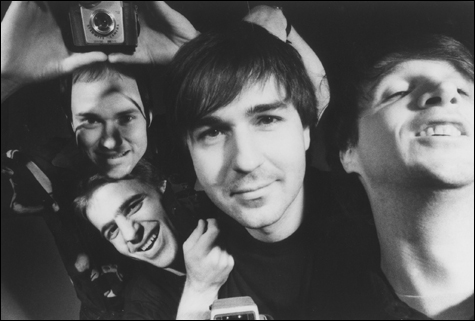Digging into Big Dipper’s Supercluster
By BOB GULLA | February 27, 2008

THE WAY THEY WERE: Dipper’s Bill Goffrier, Jeff Oliphant, Gary Waleik, and Steve Michener. |
Sometimes listening to a record is more than just listening to a record. That’s an inelegant way of saying that a record holds more than just what’s in its “grooves.” Favorite discs bring along a bunch of random associations — some musical, some social, and some personal — that jar powerful memories when activated. This is what listening to Supercluster: The Big Dipper Anthology did for me recently.
For a few years in and around Boston in the late ’80s, Big Dipper was it. Amid a mighty Beantown scene that included heavyweights Buffalo Tom, the Pixies, the Lemonheads and Dinosaur Jr., Big Dipper more than held its own, with a regular guy angle and transcendent indie pop. The band arose out of the Mission of Burma/Volcano Suns/the Embarrassment gang that a few years prior saturated the city with itchy, angular riffs and explosive gigs. At its best, Big Dipper fused Burma’s punky fire with Dumptruck’s brainiac approach and added a sublime sense of melody, plus a really quirky but legit lyrical side. On songs such as “She’s Fetching” and “All Going Out Together,” Big Dipper sure had it rolling.
The emergence of Supercluster is awesome for a few reasons, beyond the simple beauty of the listening experience. First, the band is emblematic of an era in indie rock that was in danger of disappearing entirely, as if it never existed. Like the work of hundreds of bands in the same era, Big Dipper’s music deserves to live on ad infinitum. But because of circumstances and a bad short-term memory, it’s currently on the endangered species list, surviving only in the vinyl collections of aging hipsters. Like Geos and Pacers, whose existence is now primarily proven only in pictures, the indie rock of the ’80s, before CDs truly took root, is nearly gone. How could one of the best bands in Boston at such a heady time in the city’s musical history have no artifact out to prove it existed?
Also, Big Dipper and their Boston kin — the Bags, the Lyres, Moving Targets, Cave Dogs — represented, in retrospect, the last hurrah of non-commercial indie rock. From that point forward, corporations obliterated the alternative music industry; BD and the Cave Dogs signed to the majors and imploded. It took two decades and the Internet boom for it to regain its footing.
Yeah, I was in that Boston scene with my whole heart and soul before moving to Providence in the early ’90s, and I recall clearly the power and glory of shows by Big Dipper and the aforementioned bands. Listening once again to these songs — and hearing in my head the band’s covers of “Jet” and Husker Du’s “The Girl Who Lives On Heaven Hill” — makes Big Dipper alive once more.
 Related
Related:
June tunes, About a girl, Rock therapy, More 
- June tunes
Mark Twain once observed that it’s “better to be a young June-bug than an old bird of paradise.”
- About a girl
“Mary Lou Lord has been almost written out of the Kurt Cobain story,” writes True. “Yet I have a strong memory from around this time of meeting a besotted Kurt going on about how in love with her he was, and how he was going to move to Boston to be with her.”
- Rock therapy
'Some people have songs about ex-girlfriends. We don’t have songs like that.’ Aberdeen City, "God is Going to Get Sick of Me" (mp3)
- Taking flight
“It’s that classic New England heavy thinking man’s rock,” is how Sonic Youth guitarist and Northampton resident Thurston Moore puts it. The Boston hit list: Ten local bands you need to see. By Matt Ashare More Thurston Moore: What a Sonic Youth guitarist does in Northampton. By Matt Ashare Black Helicopter, "Buick Electra" (mp3)
- Cat Power
It may be her own fault, but Chan Marshall can’t seem to win for losing.
- Pop elegy
If every generation has its Love Story , its tragic tale of romance and loss, then Rob Sheffield’s Love Is a Mix Tape is that book for those who came of age with indie rock.
- Darling Downs
Australia has always had a way of taking American genres and making them their own in a down-to-earth way, from the breeziness of singer-songwriter Paul Kelly to the power pop of the Hoodoo Gurus and You Am I to the garage rumblings of Lime Spiders and Jet.
- Déjà vu
Prepare yourselves: R.E.M. have decided to become a rock band again.
- O, Canada!
You’d be forgiven for assuming that nothing’s been going on in Canada for the last few years beyond the interconnected shenanigans of that country’s indie-rock elite.
- Second job
Tyler Ramsey is currently touring the country pulling double duty as both a solo singer-songwriter and a recent-addition guitarist in Band of Horses.
- The Color Fred
It shouldn’t come as any surprise that Bend To Break sounds a whole lot like Foo Fighters.
- Less

 Topics
Topics:
New England Music News
, Entertainment, Music, Pop and Rock Music, More  , Entertainment, Music, Pop and Rock Music, Concerts and Tour Dates, Mission of Burma, Dinosaur Jr., Shootings, Alternative and Indie Rock, Husker Du, Paul Geremia, Less
, Entertainment, Music, Pop and Rock Music, Concerts and Tour Dates, Mission of Burma, Dinosaur Jr., Shootings, Alternative and Indie Rock, Husker Du, Paul Geremia, Less 